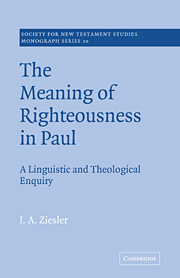Book contents
- Frontmatter
- Contents
- Preface
- Abbreviations
- Introduction
- 1 The Old Testament
- 2 Greek Usage of δíκαιος and cognates
- 3 Later Judaism I: the Septuagint
- 4 Later Judaism II: Intertestamental writings
- 5 Later Judaism III: Philo and Josephus
- 6 Later Judaism IV: The Rabbinic writings
- 7 The New Testament apart from the Pauline corpus
- 8 Paul: Philippians, Colossians, Thessalonians, Ephesians, the Pastorals, and Corinthians
- 9 Righteousness in Christ
- 10 Galatians
- 11 Romans
- Conclusion
- Appendix I Antonyms
- Appendix II The Apostolic Fathers
- Bibliography
- Index of passages cited
- Index of authors
8 - Paul: Philippians, Colossians, Thessalonians, Ephesians, the Pastorals, and Corinthians
Published online by Cambridge University Press: 04 August 2010
- Frontmatter
- Contents
- Preface
- Abbreviations
- Introduction
- 1 The Old Testament
- 2 Greek Usage of δíκαιος and cognates
- 3 Later Judaism I: the Septuagint
- 4 Later Judaism II: Intertestamental writings
- 5 Later Judaism III: Philo and Josephus
- 6 Later Judaism IV: The Rabbinic writings
- 7 The New Testament apart from the Pauline corpus
- 8 Paul: Philippians, Colossians, Thessalonians, Ephesians, the Pastorals, and Corinthians
- 9 Righteousness in Christ
- 10 Galatians
- 11 Romans
- Conclusion
- Appendix I Antonyms
- Appendix II The Apostolic Fathers
- Bibliography
- Index of passages cited
- Index of authors
Summary
The following examination assumes the results of the theological and especially the linguistic enquiry in the foregoing, the main points of which are:
The verb is predominantly declaratory, forensic, relational; or, it may denote the demonstration of an already existing righteousness. It very seldom indeed means ‘make righteous’, either in Greek or in the Hebrew equivalent. There is a harmony of forensic and ethical, except for the Rabbinic use of the Hebrew equivalent to mean ‘treat generously’.
The noun and adjective are normally used to denote a way of acting, and less often to denote the character which lies behind the acting. In the OT it (or its Hebrew equivalent) may in a small minority of cases mean the consequent status of someone who acts in this way, but the minority is so small that this meaning cannot be adopted unless the context demands it. In later literature, this meaning almost totally disappears, and is not found at all in secular Greek.
An exception to the previous point is found in the doctrine of Merits, where ‘righteousness’ (zekuth) may be either right behaviour, or the consequent merit. Yet this is not to say that it becomes in such contexts a purely relational word, for a merit always represents something done, by oneself or by someone else, even if the thing done is simply putting trust in God.
If we ask what sort of activity is denoted, there is nothing in later literature to contradict, and much to confirm, the OT meaning ‘loyalty to the covenant’. This, by analogy, applies even to some secular Greek literature.
- Type
- Chapter
- Information
- The Meaning of Righteousness in PaulA Linguistic and Theological Enquiry, pp. 147 - 163Publisher: Cambridge University PressPrint publication year: 1972

